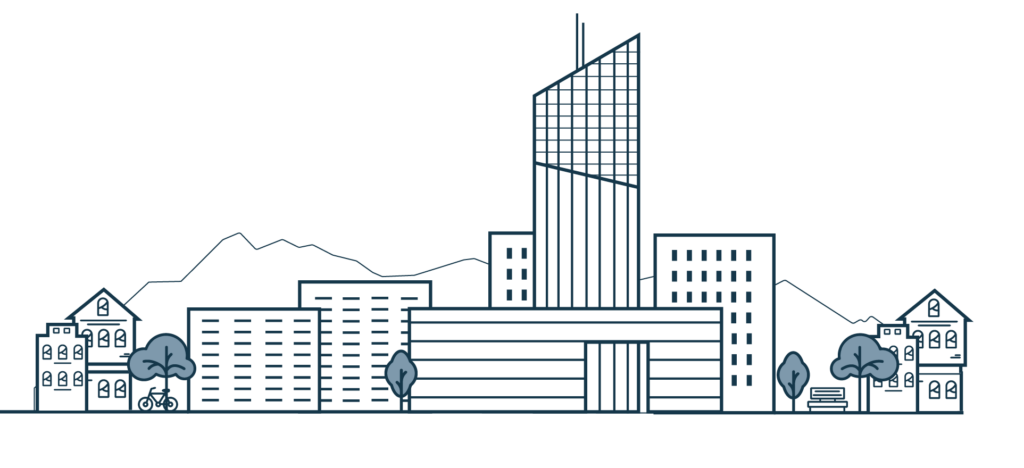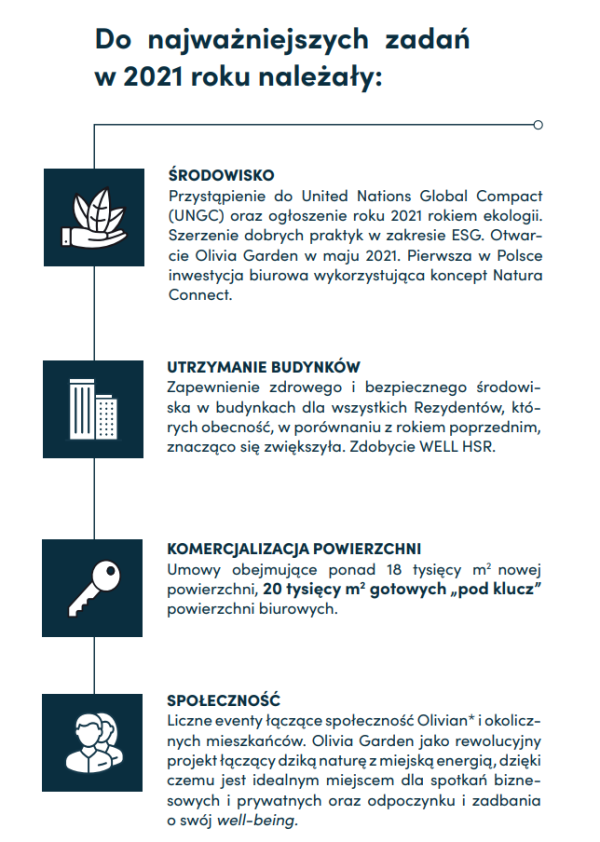If the real estate market, following the example of the youth “word of the year”, were to create its ranking of the hottest topics of 2021, then Environmental, Social and Corporate Governance, or ESG, would be a concept that would be at the forefront. Despite the fact that it is mentioned in all cases during every industry conference and in numerous publications related to the real estate market, only 33% of market representatives prepare reports defining their good practices in the field of environmental and social policy management, and only 11% of companies make them available to a wide audience. Olivia Centre has just been included in this small group, as it has published its first summary of initiatives in line with the ESG policy.

Olivia Centre is the largest business centre in northern Poland and one of the largest in Central and Eastern Europe. It consists of 9 buildings located in the heart of the Tri-City agglomeration. In recent months, Olivia has been developing projects focusing on four key areas, which allowed for the effective implementation of the assumed development strategy. These areas are: sustainability and environment, communication and stakeholder outreach, community focus, and safety. The report prepared by us fits perfectly into the long-standing policy of the entire Tonsa Group (the owner of Olivia Centre), based not only on maximizing returns, but also on focusing on social benefits and care for the natural environment.

Ecology
– We are aware of the responsibility resting on our shoulders towards the region, the country and the ecological planet from the perspective of a sector that has a significant impact on shaping trends and good practices on the market. – says Agata Kwapisiewicz, ESG Officer at Olivia Centre. “We know that the process of building new properties and maintaining them for many years is of great importance for the climate. This importance has been highlighted, among others, in the report “Responsible investments. ESG in the real estate market” by ThinkCo from 2021, according to which the construction sector is responsible for about 30% of greenhouse gas emissions globally and consumes about 40% of energy. That is why putting people and the environment at the centre of thinking about real estate is our most important task.
For this reason, among others, 2021 was announced in Olivia as the Year of Ecology, during which numerous ecological initiatives were launched. Each decision was based on care for sustainable development, a positive assessment of the impact of the company’s operations on the natural environment, and a focus on minimizing the carbon footprint. For example, all of Olivia’s office buildings meet the strict requirements set by the building certification systems BREEAM and WELL. In addition, each of the actions taken is intended to contribute to the achievement of the ambitious objective of by the end of 2025, 50% of the electricity consumed in Olivia Centre came from renewable sources. The Tonsa Group’s commitment to reducing its carbon footprint is also related to its focus on cooperation with local business partners, who are the as many as 99% of Olivia’s co-operators. The analysis of the activities carried out so far has also made it possible to change the policy in the field of waste treatment. As a result, the amount of metal and plastic waste was reduced by as much as 26%, and residual waste by 24%. On the other hand, the amount of glass sent for recycling increased by 16%. As the first office center in Poland, we implemented Tork PaperCircle – an innovative service for recycling used paper towels. This type of waste management has an important dimension. Thanks to its implementation, the reduction of CO2 consumption generated in connection with paper production reaches 40%. Now exactly 100% of the towels are recycled and can be reused.
Stakeholders
Olivia has been implementing a number of projects for years, thanks to which it can be considered a leader in the field of involvement in the local community. The solutions we implement are analyzed at the planning stage in terms of the expectations and needs of various stakeholder groups. They are based on social participation and are often carried out with the participation of the inhabitants of Gdańsk, including the Oliwa district.
“We also try to talk about the district in an interesting, non-standard way, promoting Oliwa and bringing its history closer. In a series of original films entitled “Oliwa As You Don’t Know It” we showed extraordinary places in Oliwa and extraordinary people who create the atmosphere and history of this place. – says Bogusław Wieczorek, Plenipotentiary of the Management Board of Olivia Centre. – With a view to the dynamic development of the district, we co-financed local initiatives as part of the Oliwa Neighbourhood Budget. As part of the project, we financed the Christmas Festival in Oliwa, the Oliwa Recreation Station, physical activities for people affected by Parkinson’s disease and many other important initiatives.
We cooperate with numerous organizations to stimulate entrepreneurship and optimal development of modern cities. Among them are the Employers of Pomerania, the City of Gdańsk and the Gdańsk University of Technology. Among the joint initiatives, it is worth mentioning, for example, the scientific project CRUNCH. Olivia Centre is implementing it (under the aegis of the Gdańsk University of Technology) in an international consortium. The presentation of the project took place at the Venice Biennale.
In Olivia, there is a group called Obywatelk, which implements a number of local social initiatives. As part of it, a collection of computers and laptops for children from Pomeranian schools was organized to ensure the possibility of remote learning during the Covid-19 pandemic and to counteract the digital exclusion of children who previously did not have computers. Together with Caritas of the Archdiocese of Gdansk, the members of the Social Activist group took care of the elderly by providing them with m.in. food and Easter packages. Throughout the pandemic, Olivia financed and delivered protective clothing and lunches to employees of two hospitals in Gdansk. Olivia’s community is an active, integrated group that is not only a market differentiator of the Gdańsk facility, but is often recognized by residents as an important factor influencing the satisfaction and sense of fulfillment of their employees.
A number of projects carried out in Olivia have their origin in the community of residents, which is part of the decision-making process regarding the solutions prepared in the centre. The most important result of this cooperation is the commissioning of Olivia Garden. It is an exotic garden with an area of 740 m2 and a height of 9 meters, with a mezzanine of more than 100m2. The garden was planted with 4,000 plants representing more than 150 species. In 2021 won an award in the CIJ Awards Poland competition, in the Best Interior/Exterior Design category, and in 2022 the European Property Award. The aim of the project was to create a space thanks to which you can relax, calm down and rebuild inner harmony, which is extremely pleasant among such a large number of delightful plants, reaching up to 11 meters. The space of Olivia Garden complemented the concept of a modern centre, open to employees and residents of the Tri-City, where the needs of stakeholders are treated as a priority.
Olivia is still being developed in the spirit of a multifunctional and friendly centre. In addition to office space, a number of services are available here, m.in. a medical center, a pharmacy, a hairdresser, a kindergarten, a primary school, a high school, 8 restaurants and cafes, an exotic garden, a bakery or a fitness club. At the top of the tallest building, Olivia Star, there is a public viewpoint loved by locals and tourists, restaurants run by Paco Perez – winner of 5 Michelin stars, and an event and conference center. This makes it a friendly and accessible place for the entire local and international community.
Safety
The report also includes a report on the steps taken to ensure the safety of residents and visitors to the centre. The department responsible for ensuring the safety of the facility consists of 75% certified paramedics, and all of Olivia’s employees and associates have been trained in health and safety and first aid. The WELL Health & Safety Rating certificate, obtained in 2021 and confirmed a year later, confirmed that Olivia Centre is the safest place to work in the world, as Olivia met all certification criteria in 100% in all 25 categories analysed. No other business center in the world has climbed to this level of security. Such a result is a proof of the highest quality of services provided and solutions implemented. A unique solution implemented by us is air ionization. This process is used in the most prestigious facilities of the world, which includes m.in. The White House, Harvard University or the Presidential Palace in Abu Dhabi.
“We have been and are aware of the need to build and maintain our buildings sustainably. – emphasizes Maciej Grabski, investor of Olivia Centre. –We know that the irresponsible use of natural resources and energy is ethically, financially and ecologically costly. In the coming year, we intend to develop this area by focusing on the evolution of our goals and objectives in the field of sustainable development, which are commonly divided into three spheres – environment, society and corporate governance, which together form ESG. The ESG priority is to further structure and systematize our activities in terms of sustainable development, and the challenge for the next 5 years is to maintain the status of Olivia Centre as a safe, healthy and friendly work and leisure environment, regardless of the changes affecting the working lives of people around the world. All our activities are carried out in accordance with the law and in accordance with the current trends and directions in business, which we also set. We are an integral part of the Tri-City and make a significant contribution to the regional business and economy. Olivia attracts investments and provides jobs. But that’s not all. It also organizes numerous cultural, social, sports and other active leisure activities. The purpose of the report is to give stakeholders an overview of our impact on the local economy, environment and society.
Methodology
The report is based on the international GRI reporting standards and the TCFD (Task Force on Climate-Related Financial Disclosures) guidelines for climate disclosures.
– Tonsa developed it despite the fact that it is not obliged to prepare a non-financial report, but taking into account the expectations of stakeholders and legislative changes, including the CSRD Directive, it has already decided to prepare a sustainability report. This decision is based on the desire to communicate openly with our stakeholders and to identify important aspects related to the environment. On the other hand, the use of objective standards and guidelines will allow them to be compared with the market. says Bogusław Wieczorek.




